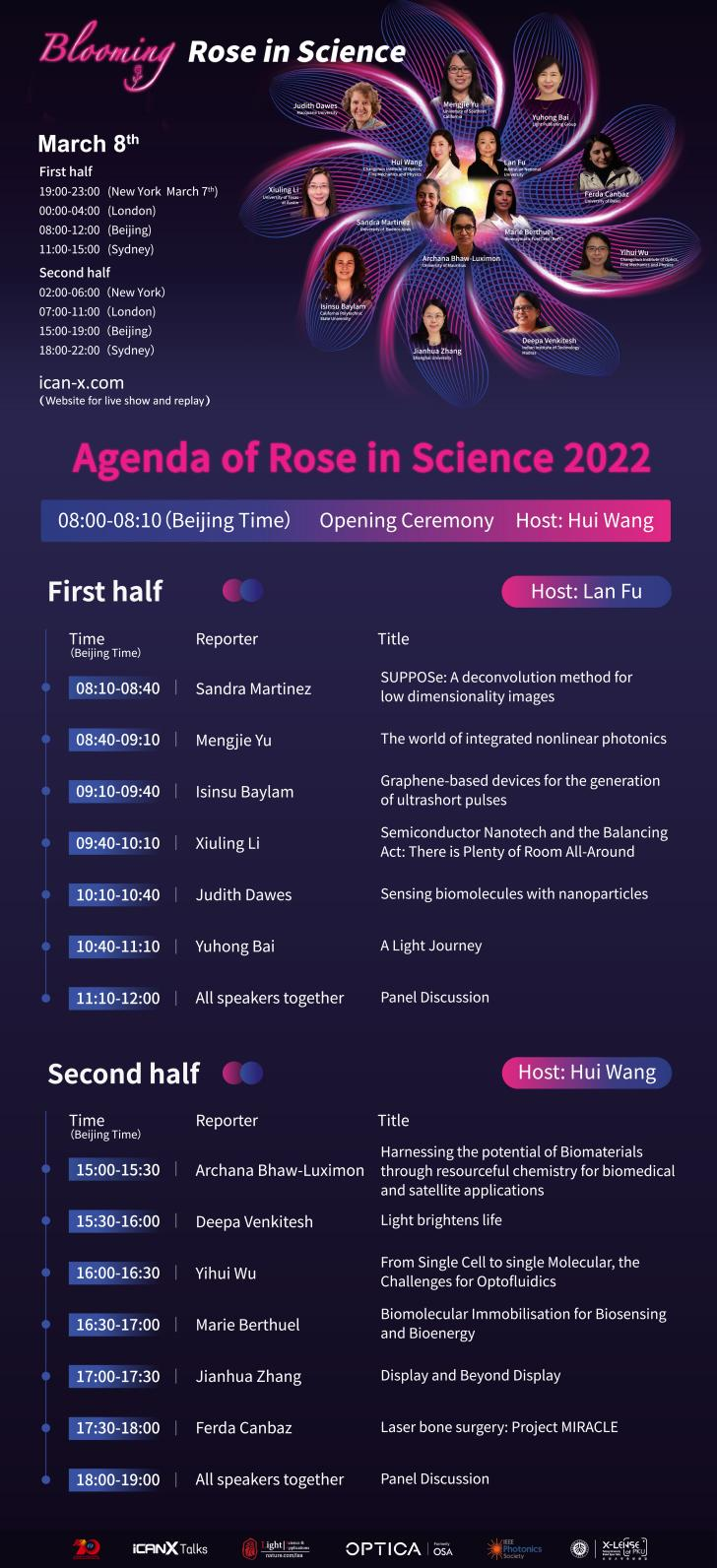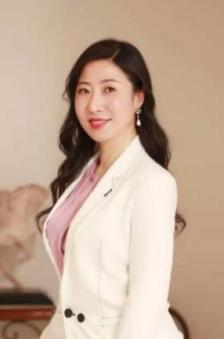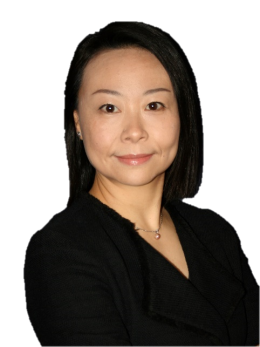
The Rose in Science Event (abbreviated to RISE) was initially launched by CIOMP in 2015 to mark the 2015 UN "International Year of Light".
So far this celebration of female science workers has been successfully held for 4 years. In 2021, RISE went from offline to online, with iCANX platform, the IEEE Photonics Society, the Optica, and the famous optics journal Light: Science & Applications joining in as co-organizers, giving the event a much greater and wider international influence.
This year, we have invited female scientific researchers from six continents, including Asia, Europe, Africa, North America, South America and Oceania. They come from different countries, different age groups, and are working in different research fields. However, they do have one thing in common, they are all outstanding scientists. And today they will talk about their research work, life experience and insights.
With RISE, we aim to bridge the physical distance between people, and achieve heart to heart communication. "Women" are working alongside "men" all over the world to promote scientific and technological progress. With RISE, our goal is to help those young women who dream of having a career in scientific research find their own "life coordinates", and show them what is possible if they persevere. A philosopher once said, roses do not bloom hurriedly; for beauty, like any masterpiece, takes time to blossom. But we all know that blossom they will, the lovely roses, in the green and lush garden of science.
Hosts' introduction
 |
Host: Hui Wang Affiliation: Changchun Institute of Optics, Fine Mechanics and Physics, iCANX Story Co-founder Hui Wang is the Deputy Director of the Office of International Cooperation in the Changchun Institute of Optics, Fine Mechanics and Physics (CIOMP), Chinese Academy of Sciences (CAS). She currently works on international communication and cooperation for the CIOMP and was a founding member for the Nature Publishing Group and CIOMP joint journalLight: Science & Applications. She is the founder of “Rose in Science” and has published several articles inActa Editologica, International Talent, Light: Science & Applications,etc., and was invited to take an interview by SPIE Women in Optics, which was published in 2015. |
 |
Host: Lan Fu Affiliation: Australian National University, iCANX Talks Co-organizer Lan Fu is currently a Full Professor and Head of the Department of the Electronic Materials Engineering at the Research School of Physics, ANU. Professor Lan Fu’s main research interests include design, fabrication and integration of optoelectronic devices (LEDs, lasers, photodetectors and solar cells) based on low-dimensional III-V compound semiconductor structures including quantum wells, and nanowires grown by metal-organic chemical vapour deposition (MOCVD). She has published ~200 publications (including 140 journal papers), 3 book chapters, co-edited 5 conference proceedings/journal special issue, and holds 2 US patents. Professor Fu is a senior member of IEEE, IEEE/Photonics and Electron Devices Societies and was the past chair of the Photonics Society, Electron Devices Society and Nanotechnology Council Chapters of the IEEE ACT section. She is the current Chair of IEEE Nanotechnology Council Chapters & Regional Activities Committee, Associate Editor of IEEE Photonics Journal, and member of Editorial Board of Opto-Electronic Advances. |
Guests' introduction
|
|
Speaker: Sandra Martinez Affiliation: University of Buenos Aires Professor S.Martínez studied mathematics at the University of Buenos Aires where she gained her PhD degree in 2007 in the area of Free boundary problems. She has publications in different areas like differential equations, free boundary problems going through theory, analysis of existence, behavior, and regularity of solutions and numerical problems. She is Professor in the Mathematics Department where she developed the deconvolution method SUPPOSe, that converts the ill posed problem of deconvolution into a well posed one for the case of positive sources. This method was a breakthrough highlighted in OPN 2020. Research interests are numerical methods for enhanced microscopy resolution and numerical analysis. |
|
|
Speaker: Mengjie Yu Affiliation: University of Southern California Mengjie Yu is Gabilan Assistant Professor in the Department of Electrical and Computer Engineering at University of Southern California (USC). She received her Ph.D. degree in Electrical and Computer Engineering in 2018 from Cornell University and held research staff associate position in Applied Physics and Mathematics at Columbia University from 2015-2018. Her research group of “Nanoscale Nonlinear and Quantum Photonics Lab” leads efforts in advancing the fundamental understanding of nonlinear sciences at nanoscale, as well as realize next-generation optoelectronic circuits for optical communication, computing, sensing, ranging and metrology. She is the 2020 the Optica (formerly OSA) Ambassador, the Caltech 2019 Young Investigator Lecturer and the Rising Star Women in Engineering in the Asian Deans Forum 2019. |
|
|
Speaker: Isinsu Baylam Affiliation: California Polytechnic State University Dr. Isinsu Baylam Toker currently works as a lecturer at California Polytechnic State University (Cal Poly) Materials Engineering Department. Her research interests include femtosecond lasers, applications of lasers, graphene and graphene-based saturable absorber devices, and nonlinear optics.?She received her BS degree in physics from Bilkent University, Ankara, Turkey, in 2010 and her MS and PhD degrees in physics from Koc University, Istanbul, Turkey, in 2012 and 2017. Dr. Isinsu Baylam Toker received Newport Research Excellence Award and two Outstanding Oral Presentation Awards at SPIE Photonics West Conference, and Optica Advanced Solid-State Lasers Conference, Boston MA, US in 2016. In 2018, she was elected as one of the 2019 Ambassadors of Optica and she was also nominated to participate 69th Lindau Nobel Laureate Meeting. |
|
|
Speaker: Xiuling Li Affiliation: University of Texas at Austin Xiuling Li received her B.S. degree form Peking University and Ph.D. degree from the University of California at Los Angeles. Following post-doctoral positions at California Institute of Technology and University of Illinois, as well as industry experience at II-VI, Inc. (formerly EpiWorks, Inc.), she joined the faculty of the University of Illinois, Urbana-Champaign (UIUC) in 2007 and then relocated to University of Texas (UT) at Austin in Aug. of 2021. She has published >160 journal papers and delivered > 120 invited lectures worldwide. Her research has been honored with the NSF CAREER award, DARPA Young Faculty Award, and ONR Young Investigator Award. Among her synergistic activities, she served as the VP of Finance and Administration of IEEE Photonics Society, on the Fellow evaluation committee of IEEE Electron Device Society, and IEEE Nanotechnology Council Fellow Search Committee. She has been a Deputy Editor of Applied Physics Letters since 2015. |
|
|
Speaker: Judith Dawes Affiliation: Macquarie University Judith Dawes is a Professor of Physics and Director of MQ Photonics Research Centre at Macquarie University, Sydney, Australia. After holding postdoctoral positions at the University of Toronto, Canada, and Macquarie University, she was appointed to a faculty position at Macquarie where she served as head of the department of physics and astronomy from 2013 to 2015. She was elected Treasurer of Science and Technology Australia, from 2017 to 2021. From 2003 to 2017, she was a chief investigator of the Australian Research Council Centre of Excellence for Ultrahigh-bandwidth Devices for Optical Systems (CUDOS).?She served as President of the Australian Optical Society (AOS) from 2010 through 2012 and as a member of the AOS council from 2007 through 2014. Her research achievements include the crystal growth, optical characterization, and laser operation of a new laser crystal, Yb:YAB, etc. |
|
|
Speaker: Yuhong Bai Affiliation: Light Publishing Group Yuhong Bai was born in Changchun, China. She received a BSc degree in electronic engineering from Jilin University, a MSc degree in optical engineering from Chinese Academy of Sciences and a PhD in management science and engineering from Dalian University of Technology. She joined the Changchun Institute of Optics, Fine Mechanics and Physics (CIOMP), Chinese Academy of Sciences (CAS), as an assistant professor in 1986, and was appointed full professor in 2005. She is the Director of Light Publishing Group of CIOMP. She is one of the founding persons and chief editor of journal Light: Science & Applications. |
|
|
Speaker: Archana Bhaw-Luximon Affiliation: University of Mauritius Dr Bhaw-Luximon is Associate Professor and Head of the Center for Biomedical and Biomaterials Research, University of Mauritius. She received her PhD under the supervision of Prof Dhanjay Jhurry who pioneered polymer chemistry and the setting-up of the Chemical Society of Mauritius (CSM). She was a TWAS Young Affiliate and contributed to human capacity building initiatives for early career African scientists. She received the UNESCO Merck Best African Woman Researcher Award, 2017. She has published 70 research papers. She was selected by the New York Academy of Sciences as Future Leader to the 11th Science and Technology in Society Forum, Japan, October 2014, Outstanding Young Scientist, 1st Commonwealth Science Conference, Royal Society (UK), Bangalore, India, November 2014 and Commonwealth Science Award for Established Scientists, Royal Society (UK), Singapore, June 2017. She was appointed as Visiting Professor, Zhejiang Sci-Tech University. |
|
|
Speaker: Deepa Venkitesh Affiliation: Indian Institute of Technology Madras Deepa Venkitesh joined as an Assistant Professor in the Department of Electrical Engineering in the Indian Institute of Technology Madras (IIT Madras), where she currently is working as a Professor. She set up the high speed optical communication laboratory there, where the focus is on demonstrating photonic signal processing for high speed analog and digital communication systems. Her work is primarily experimental in nature. She also works on building fiber lasers- especially at 2 micron wavelengths. She was awarded the Young Faculty Recognition Award of IIT Madras in 2011, and the Abdul Kalam Technology Innovation Fellowship of the Indian National Academy of Engineers in 2021. She has guided several students at the Post-Doctoral, Doctoral, Masters and at the undergraduate level. She takes pride in the fact that her students are now all across the globe, spreading goodness and knowledge. She also believes strongly that effective and useful work can be done through team work and collaboration. She is an Associate Editor with the Optica Journal, Advances in Optics and Photonics. She is the AVP of Women in Photonics of the IEEE Photonics Society. |
|
|
Speaker: Yihui Wu Affiliation: Changchun Institute of Optics, Fine Mechanics and Physics Professor Yihui Wu, received her PhD degree in Engineering from Changchun Institute of Optics, Fine Mechanics and Physics (CIOMP) in 1996. She is a distinguished professor of Chinese Academy of Sciences and a general councilor of Chinese Micro/Nano Society. In 2000, she was invited to work in Femto-ST laboratory in France for one year. She had won the title of national female worker model of meritorious service and young professional and technical talents with outstanding contributions in Jilin Province. Currently, as the project leader, she is undertaking the major instrument special projects of The National Natural Science Foundation of China. Her research direction includes microfluidic control, biosensing, Raman spectroscopy, gene sequencing, etc. More than 100 papers have been published in SCI journals, and more than 30 invention patents have been authorized. In 2010, won the first prize of Science and Technology Progress of Jilin Province (ranked first). |
|
|
Speaker: Marie Berthuel Affiliation: BeFC (Bioenzymatic Fuel Cells) Dr. Marie Berthuel has graduated from a PhD in Molecular and Structural Physical Chemistry from the Molecular Chemistry Department of the University of Grenoble (UGA) in France. At the interface of various fields: Chemistry, Materials Science, Electrochemistry and Biology, the focus of her thesis was to implement microstructured electrodes as a basis for building biosensors and immunosensors for the detection of vector borne diseases (e.g. Dengue and West Nile virus). Prior to embarking on a PhD in France, Marie graduated from two Master’s degree: in Formulation and industrial Chemistry from UCBLyon1 (Class of 2016) and a Master’s degree of Sciences, Chemistry from the University of Oregon (Class of 2015). During her time at the University of Oregon, she also played in the women’s basketball team as a walkon in NCAA division 1; coached by Kelly Graves. In the last year of her thesis, Marie participated in the creation of the startup BeFC (Bioenzymatic Fuel Cells), first as a communication officer and then, after her PhD, as a Senior Scientist developing the core technology. Now she is Product & Communications Manager working at the interface of clients, suppliers and the R&D team. |
|
|
Speaker: Jianhua Zhang Affiliation: Shanghai University Jianhua Zhang is currently a Professor in Shanghai University, China. She received the Ph.D. degree of engineering in 1999,Shanghai University, China. From 2001 to 2003, she worked at the Department of Electrical and Electronic of City University of Hong Kong in Hongkong, and Center for Microsystem Technology of Scotland in Heriot-Watt University, Edinburgh, UK. Currently she is the Chief professor and director of Key Laboratory of Advanced Display and System Application (Ministry of Education), Shanghai University, China. She was awarded as the National Science Fund for Outstanding Young Scholars (2018). She have been awarded 3 times the first-grade prize of science and technology in Shanghai, respectively in 2014, 2016, 2020. She is now an associate chief editor of Advanced in Manufacturing, and chairman in eastern region of Society for Information Display (SID) Beijing Chapter, chair in OLED technical committee of SID Beijing Chapter. Her main research area is new display devices, materials, system, flexible electronics such as flexible transducers, flexible display, and wearable medical devices. |
|
|
Speaker: Ferda Canbaz Affiliation: University of Basel Ferda Canbaz is currently a postdoctoral researcher and the acting/interim group leader at the Department of Biomedical Engineering, University of Basel, in Switzerland. She was born in Kirklareli, Turkey. She received her BSc degree in Engineering Physics from Istanbul Technical University in 2011. Later, after a Master of Science degree in Optoelectronics and Photonics Engineering Program from Koc University in 2013, she became the first female optoelectronics and photonics engineer in Turkey. She then pursued a PhD degree in Physics at Ko? University in Turkey and successfully received her degree in 2018. In the recent years, she mainly focuses on the optics related technological developments in the field of bone surgery. She is doing active research under a flagship project called MIRACLE, which is in short for minimally invasive robot-assisted computer-guided laser osteotome, to develop smart laser systems, where she develops alternative laser technologies for minimally invasive laser surgery. |
